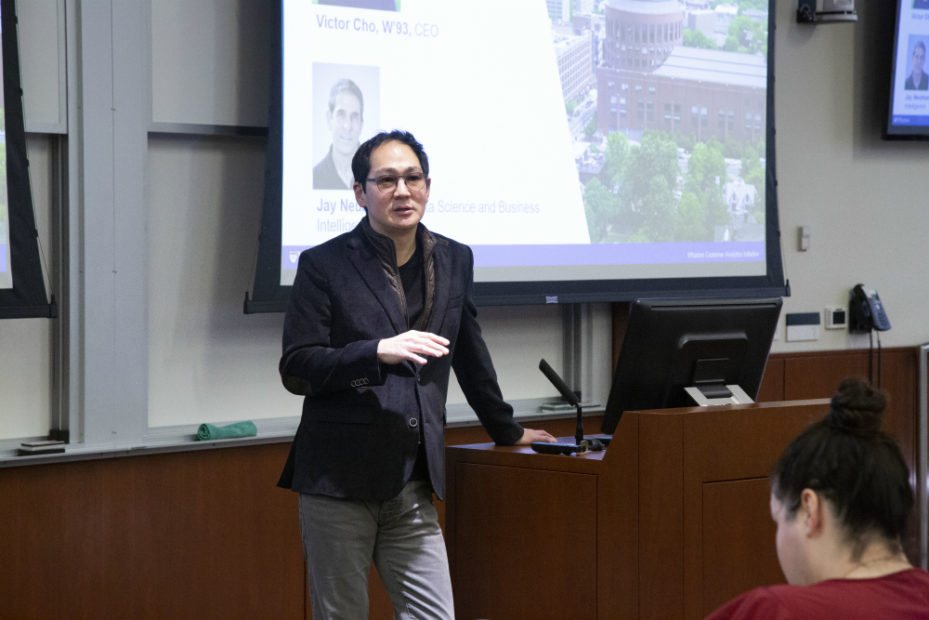On February 22, 2019, Wharton Customer Analytics Initiative (WCAI) welcomed Evite — a Los Angeles-based online invitations and RSVP platform — to the culmination of the WCAI Datathon, which was sponsored by the company. Student teams of all years across Wharton and Penn gathered in Steinberg-Dietrich Hall to present their findings to the Evite representatives: CEO Victor Cho, W’93, and Vice President of Data Science and Business Intelligence Jay Neuman.
Analyzing Real Data
The Datathon gave students a real Evite user dataset and encouraged them to use their analytics skills to come up with creative ways to drive the company’s business value. The exercise gave the teams a taste of working with data outside the classroom.
“One of the great things about a hackathon is that you get to work with real-world data which is very messy,” said Victor Cho. “A lot of the time, in an academic class, you get a clean, curated, almost a perfect dataset so you can learn the concepts, which is great for learning concepts. The reality of the real world is that it’s really messy. And so, they get a practical understanding of what it’s going to be like to apply these skills in the real world environment, and that’s super valuable.”
Datathon participant John Homans, WG’19, said that the most challenging aspect about analyzing real user data was balancing detail and computing time.
“There were many files with different pieces of information. Some were workable with a high powered laptop, some weren’t. The lengthy compute time meant tradeoffs between having richer data but only being able to perform shallow analysis, or robust analysis with incomplete data. This further sparked questions of what were the most important parts of the data, and what analyses could be performed with which parts,” John said.

Returning to Wharton
While Evite is based in California, Cho said that as an undergraduate alumnus, he knew he wanted to choose Wharton’s Philadelphia campus to host the Datathon. What confirmed his choice was the breadth of programs offered by WCAI.
“I got invited to speak at a keynote session here a year ago, and I actually wasn’t even familiar with the [WCAI] program until then. And that’s where I met Raghu [Iyengar], Eric [Bradlow], and others and was super impressed with everything that they were doing,” he said. “That’s where I learned about the WCAI sponsorship opportunities. It was a natural fit given that [Wharton has] passion around data, and it’s at my alma mater.”
After hearing the Datathon finalists’ presentations, he was impressed with the quality of the students’ work.
“I was amazed by the amount of depth that these teams were able to produce in just a couple of weeks. The winning team actually built a working machine-learning algorithm that we could potentially plug into our site in a couple of weeks. I was blown away by the depth of the analysis that was done,” he said.

New Pathways for MBAs
While data analytics remains a somewhat nontraditional major for MBA students, its wide range of applications continues to grow, along with its popularity each year. John, an incoming data scientist at Facebook, thinks there’s a demand for MBAs who understand the rigorous analysis process but are also able to communicate the results to company executives effectively.
“There is a certain technical skillset that is needed, which is mostly the ability to manipulate and visualize data using standard software,” he explained. “There, whichever route you came from [impacts] which side of data science is most emphasized in your education. [It] could be the engineering skill to work with data, the mathematical understanding of prediction models, [or] the product understanding and communication skills to influence change.”
“The latter is where I believe MBAs can be successful in the field. And, what is great about the MBA program at Wharton is that it provides rigorous training in the other sides as well.”
— Elis Pill, C’19
Posted: March 15, 2019


















